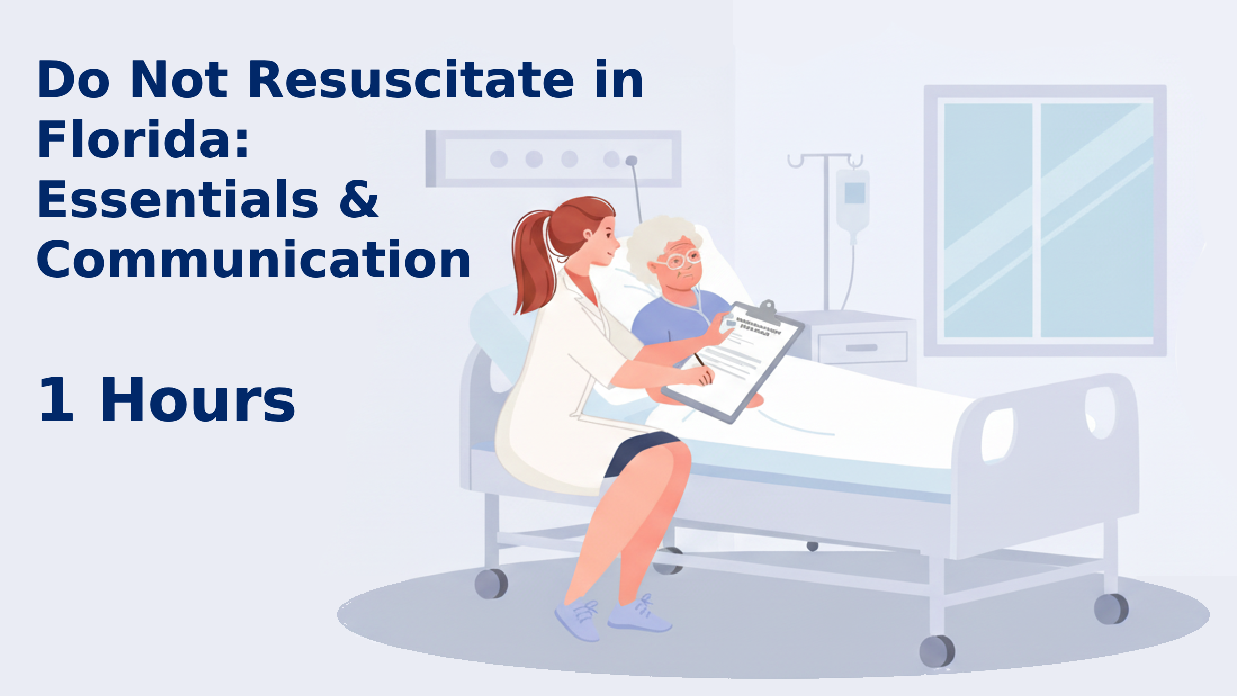Do Not Resuscitate in Florida: Essentials & Communication
Tracking # 20-1331444
Category:
Click the board buttons to see the category.
Program Objectives:
-
Differentiate DNR, DNRO, DNI, and POLST:
- Clarify definitions and key differences between DNR, Florida DNRO, DNI, and POLST/portable medical orders.
- Explain what treatments may still continue under a DNR (e.g., comfort care, symptom management, non-CPR interventions) per organizational guidance (American Heart Association; National POLST).
-
Identify Who Can Consent / Act as Surrogate in Florida:
- Determine decision-makers, hierarchy, and how to verify capacity and surrogate authority in Florida (Florida Statutes ch. 765).
- Differentiate capacity vs. competency and document assessments appropriately.
-
Complete, Store, and Present the Florida DNRO:
- Accurately complete Florida DNRO requirements so EMS can recognize and honor the order.
- Apply best practices for visibility (original form access, bedside placement, wallet copies) and transport packets across care transitions (Florida Department of Health; Florida Administrative Code r. 64J-2.018).
-
Lead Values-Based Goals-of-Care Conversations:
- Use teach-back, shared decision-making, and serious-illness communication frameworks (e.g., Bernacki & Block) to align recommendations with what matters most.
- Translate preferences into clear, actionable medical orders (National POLST; Institute of Medicine).
-
Document, Implement, and Update Orders Reliably:
- Ensure orders are visible in the chart, EHR, and transfer paperwork; reconcile across settings (hospital, SNF, EMS, home).
- Respond to uncertainty (e.g., missing/unclear forms) using default resuscitation policies and rapid clarification pathways.
- Update or revoke orders when wishes change, following Florida law and organizational policy (American Heart Association; Florida Statutes ch. 765).
Course Overview:
This course gives healthcare staff a clear, practical framework for understanding Do Not Resuscitate (DNR) orders and Florida's Do Not Resuscitate Order (DNRO, DH Form 1896) so patient wishes are honored consistently across home, facility, transport, and emergency settings. You'll learn what DNR/DNI mean (and what they don't), how Florida's DNRO works with EMS, how POLST complements code-status orders, and how to document and communicate decisions clearly. Emphasis is on patient autonomy, informed consent, and comfort-focused care when appropriate, using plain language, step-by-step checklists, and real-world scenarios (Florida Statutes ch. 765; Florida Administrative Code r. 64J-2.018; Florida Department of Health; National POLST; American Heart Association; Institute of Medicine).
$6.00
1 Hours
